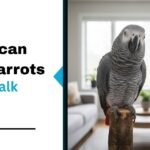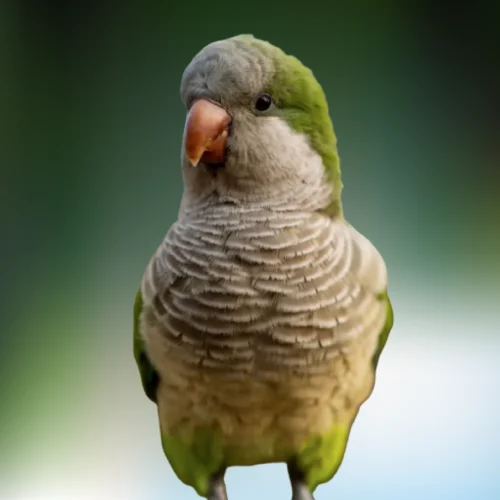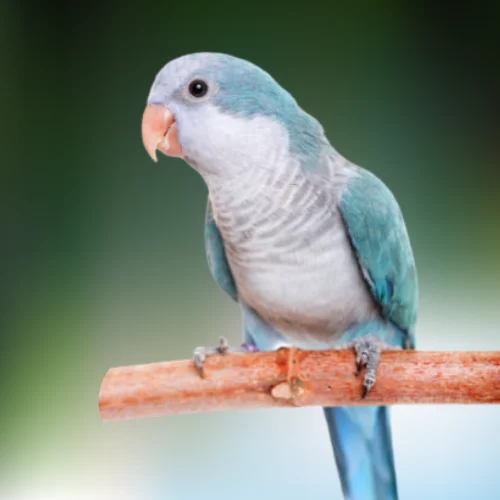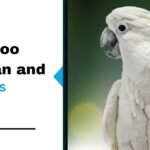

Quaker Parrot For Sale, Lifespan, Price & Care Tips
The Quaker Parrot, also known as the Monk Parakeet, is a lively, intelligent, and affectionate bird that has gained immense popularity among pet enthusiasts. With its playful personality and ability to mimic human speech, the Quaker Parrot makes a delightful companion for both individuals and families.
This comprehensive guide covers everything you need to know before welcoming a Quaker Parrot into your home—ranging from its ideal diet and average lifespan to pricing, housing requirements, training tips, and daily care. If you’re looking to adopt one of these charming birds, Dallas Parrots is a reliable source, offering hand-raised, vet-checked Quaker Parrots that are healthy, socialized, and ready to become part of your family.

What Is a Quaker Parrot?
Quaker Parrots, also known as Monk Parakeets, are small to medium-sized parrots celebrated for their bright green plumage, intelligent eyes, and outgoing personality. Despite their compact size, they possess bold, playful attitudes and are among the best talkers in the parrot world, often mimicking words and sounds with surprising clarity.
Origin, Natural Habitat, and Conservation Status
Quaker Parrots are native to South America, with their primary populations found in Argentina and surrounding countries like Brazil, Bolivia, and Paraguay. They flourish in subtropical regions where they live in flocks and build large communal nests in trees.
Adaptability and Wild Populations
Due to their remarkable adaptability, Quaker Parrots have successfully established wild colonies in parts of the United States, including Florida, Texas, and Illinois. These feral populations often live in urban areas and parks, showcasing the bird’s resilience and social nature.
Conservation and Legal Aspects
While Quaker Parrots are not listed as endangered, they are subject to legal regulations in certain U.S. states. This is mainly due to concerns that wild colonies may interfere with agriculture or native species. It’s important for prospective owners to check local laws before acquiring a Quaker Parrot.
Why They Are Considered Exotic and Rare
Quaker Parrots are admired for their remarkable ability to mimic human speech and household sounds. Their vocal skills can rival even those of larger parrot species, making them a standout choice for bird lovers who enjoy interactive pets.
Breeding and Rarity in Pet Stores
Due to specific state restrictions and their specialized care requirements, Quaker Parrots are not always readily available in every pet shop. Breeding also requires experienced care, making hand-tamed Quakers rarer and more desirable.
Why the Quaker Parrot Makes a Great Pet?
Quaker Parrots are not only known for their bright colors and lively nature but also for their ability to form deep emotional connections with their owners. Their playful demeanor and intelligence make them one of the most popular choices among bird enthusiasts.
Personality
The personality of a Quaker Parrot is a perfect mix of fun, affection, and loyalty. These birds love to interact, explore, and become part of the family routine. They thrive on attention and enjoy being involved in daily household activities, often mimicking sounds and words they hear frequently.
Loyal
Quaker Parrots form strong bonds with their owners and are known for their loyalty. Once they trust someone, they stay close, follow them around, and often show signs of missing them when apart. This makes them incredibly loving and dependable companions.
Affectionate
These birds are highly affectionate and enjoy cuddling, sitting on shoulders, or simply spending quiet time with their favorite human. Their emotional sensitivity allows them to pick up on moods and respond with comforting behavior, making them great emotional support pets.
Smart
Quaker Parrots are impressively smart. They can learn a wide variety of words, phrases, and tricks with consistent training. Their cognitive abilities allow them to solve puzzles and adapt to new environments quickly, keeping their minds active and engaged.
Quaker Parrot Available at Dallas Parrots!
Dallas Parrots is a trusted source for hand-raised and socialized Quaker Parrots. All birds are bred by ethical and experienced breeders who prioritize quality care, ensuring that every bird is tame, healthy, and family-ready.
Health Guarantee and Support
When you purchase a Quaker Parrot from Dallas Parrots, you receive a vet-checked bird with a certified health guarantee. In addition, they offer expert advice and 24/7 customer support to guide you through the bonding and care process. With affordable pricing and a strong reputation, Dallas Parrots stands out as a top choice.

Diet and Nutrition
A healthy Quaker Parrot diet should be based on high-quality pellets, complemented with fresh fruits, vegetables, and a limited amount of seeds. This balance supports their immune system and keeps their feathers vibrant.
Foods to Avoid
Toxic foods such as avocado, chocolate, caffeine, and anything overly salty should be strictly avoided, as these can be harmful or even fatal to your bird.
Tips for Balanced Nutrition
Rotate their food options regularly to keep meals interesting and nutritionally complete. Include calcium-rich items like cuttlebone or leafy greens to prevent deficiencies and ensure strong bones and beak health.
Lifespan of a Quaker Parrot: How Long Do They Live?
In a well-maintained and loving environment, Quaker Parrots can live anywhere from 20 to 30 years, making them a long-term companion.
Factors That Affect Longevity
Their lifespan is heavily influenced by a balanced diet, ample exercise, regular veterinary check-ups, and daily mental stimulation. Emotional well-being also plays a major role in ensuring a long and healthy life.
Essential Care Tips
A proper daily routine should include regular feeding times, cage cleaning, and engaging interaction. Quakers are active birds that thrive on consistency and attention.
Emotional Needs
Quaker Parrots are deeply social and emotionally sensitive. Lack of interaction can lead to boredom and behavioral issues like feather plucking or excessive screaming. They need time outside the cage and meaningful engagement.
Common Health Issues
Owners should be vigilant for signs of illness such as loss of appetite, lethargy, changes in droppings, or unusual feather behavior. Prompt veterinary care is crucial in maintaining your bird’s health.
Price: How Much Does It Cost?
Quaker Parrots generally range in price from $400 to $1000, depending on factors such as age, coloration, and breeder reputation.
Additional Costs
Beyond the initial purchase, owners should consider the cost of a spacious cage, perches, toys, a high-quality diet, and routine vet visits—essential elements for a happy and healthy parrot.
Cost at Dallas Parrots
Dallas Parrots offers competitive pricing while maintaining high standards of care. Each bird comes vet checked, with a health certificate, affordable price, and ongoing support, ensuring you receive great value and peace of mind.
Why Buy from Dallas Parrots?
Every Quaker Parrot from Dallas Parrots comes with an official health certificate, verifying that the bird is in excellent condition and free from contagious diseases.
Vet Checked
All birds are thoroughly examined by certified avian veterinarians to ensure their well-being before they are made available for sale.
Affordable Price
Despite offering premium, hand-raised parrots, Dallas Parrots maintains affordable pricing, making it easier for bird lovers to bring home a healthy companion without breaking the bank.
Housing and Cage Requirements
The recommended minimum size for a Quaker Parrot cage is 18x18x18 inches, with horizontal bars to encourage climbing and exercise.
Cage Placement
Position the cage in a quiet, well-lit room, away from direct drafts, kitchens, and areas with heavy foot traffic to ensure a stress-free environment.
Must-Have Accessories
Equip the cage with multiple perches of varying textures, chewable toys, swings, and foraging tools to keep your parrot physically and mentally stimulated.

Training and Socialization
Begin by repeating simple words and phrases in a soft, friendly tone. Consistency and patience are key to encouraging speech.
Socializing with Family
Quakers are highly social and enjoy spending time with their human family. Daily interaction helps strengthen bonds and keeps them emotionally happy.
Correcting Bad Behaviors
Address unwanted behavior through positive reinforcement like treats and praise. Avoid yelling or punishment, which can damage trust and increase anxiety.
A Quaker Parrot for Sale
Quaker Parrots come in a delightful range of color mutations that cater to different tastes and preferences. While the classic green Quaker Parrot remains the most popular and easily recognizable, other color variants such as blue, yellow (lutino), and cinnamon are also highly sought after. These mutations do not affect their friendly personality but make them visually unique and desirable, especially among bird enthusiasts and collectors.
Hand-Tamed Birds from Dallas Parrots
At Dallas Parrots, all Quaker Parrots are hand-tamed and raised in a social, loving environment. From a young age, these parrots are accustomed to human handling and interaction, making them more affectionate, responsive, and easier to train. This careful upbringing ensures that when you bring a Quaker home, you’re getting a companion that is already familiar with people, reducing the stress of adjustment and allowing for a smoother bonding experience.
How to Reserve or Purchase
Getting your own Quaker Parrot is simple with Dallas Parrots. Interested buyers can reach out via phone, the official website, or by visiting the store in person to check the availability of different color mutations and learn more about current prices. The knowledgeable staff is ready to answer your questions, assist in selecting the perfect bird, and offer expert advice on care, feeding, and training. Every bird from Dallas Parrots comes with a health certificate, is vet-checked, and is backed by affordable pricing and dedicated after-sale support to ensure long-term satisfaction.
Conclusion
The Quaker Parrot is a delightful and affectionate companion, well-loved for its charming personality, intelligence, and strong ability to bond with humans. With a lifespan that can stretch up to 30 years, it offers not just companionship, but a long-lasting relationship. Understanding the bird’s nutritional needs, providing proper housing, and investing time in training and social interaction are key to raising a happy and healthy pet.
With all these factors in place, a Quaker Parrot can thrive in a home environment. If you’re considering adding this feathered friend to your family, Dallas Parrots offers hand-raised, vet-checked Quaker Parrots that are ready to become part of your life. With expert care, 24/7 support, and affordable pricing, Dallas Parrots ensures that your journey as a bird parent starts on the right note.
Follow our Social Media Pages Facebook and Instagram.
FAQ’s
Can Quaker parrots talk?
Absolutely! Quaker parrots are among the best talking birds in their size range. They can mimic words, phrases, and even household sounds with practice and repetition.
Are Quaker parrots good for beginners?
Yes, they are a great choice for first-time bird owners. Their manageable size, friendly temperament, and ability to adapt make them beginner-friendly, though they still require daily attention.
How much is a Quaker parrot?
The price of a Quaker parrot typically ranges from $400 to $800, depending on color mutation, breeder reputation, and location.
How many eggs do Quaker parrots lay?
A female Quaker parrot usually lays between 4 to 8 eggs per clutch. They may lay multiple clutches in a year, especially during breeding season.
Can Quaker parrots be aggressive?
They can show territorial behavior or mood swings, especially during breeding season. Proper socialization, training, and attention help minimize aggression.
What are the disadvantages of Quaker parrots?
Some downsides include their loud vocalizations, occasional stubbornness, and their need for constant mental stimulation and attention to avoid boredom-related issues.
Are Quaker parrots loud at night?
Typically, no. Quaker parrots are quiet at night if they are kept in a calm, dark, and quiet environment. However, sudden lights or noises can occasionally cause them to vocalize.




